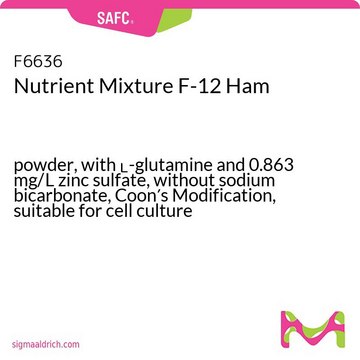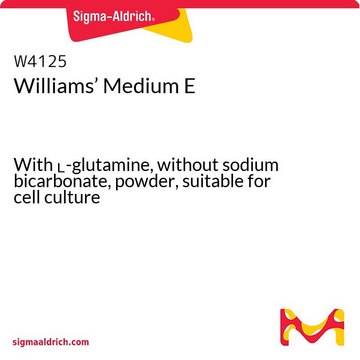N6635
Nutrient Mixture F-10 Ham
With L-glutamine, without sodium bicarbonate, powder, suitable for cell culture
Synonym(s):
Ham’s F-10
About This Item
Recommended Products
form
powder
technique(s)
cell culture | mammalian: suitable
components
HEPES: no
NaHCO3: no
sodium pyruvate: 0.11 g/L
L-glutamine: yes
phenol red: yes
shipped in
ambient
storage temp.
2-8°C
Looking for similar products? Visit Product Comparison Guide
General description
Application
- for the in vitro tissue culture from rabbit
- to culture satellite cells from fish white muscle of trout
- for culturing neonatal porcine islets (NPIs)
Quantity
Reconstitution
also commonly purchased with this product
Signal Word
Warning
Hazard Statements
Precautionary Statements
Hazard Classifications
Skin Sens. 1
Storage Class Code
11 - Combustible Solids
WGK
WGK 2
Flash Point(F)
Not applicable
Flash Point(C)
Not applicable
Regulatory Listings
Regulatory Listings are mainly provided for chemical products. Only limited information can be provided here for non-chemical products. No entry means none of the components are listed. It is the user’s obligation to ensure the safe and legal use of the product.
JAN Code
N6635-25K:
N6635-50KG:
N6635-VAR:
N6635-PROC:
N6635-50L:
N6635-BIBC:
N6635-ALC:
N6635-ALC2:
N6635-BULK:
N6635-10X1L:
N6635-2X5L:
N6635-10L:
N6635-50K:
N6635-25KG:
N6635-1L:
N6635LF1-BIBC:
Choose from one of the most recent versions:
Already Own This Product?
Find documentation for the products that you have recently purchased in the Document Library.
Customers Also Viewed
Our team of scientists has experience in all areas of research including Life Science, Material Science, Chemical Synthesis, Chromatography, Analytical and many others.
Contact Technical Service








